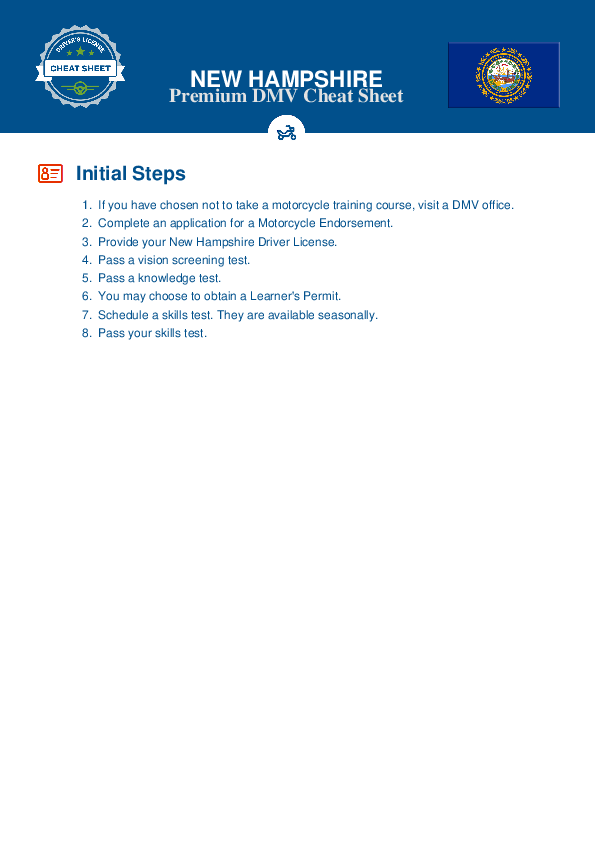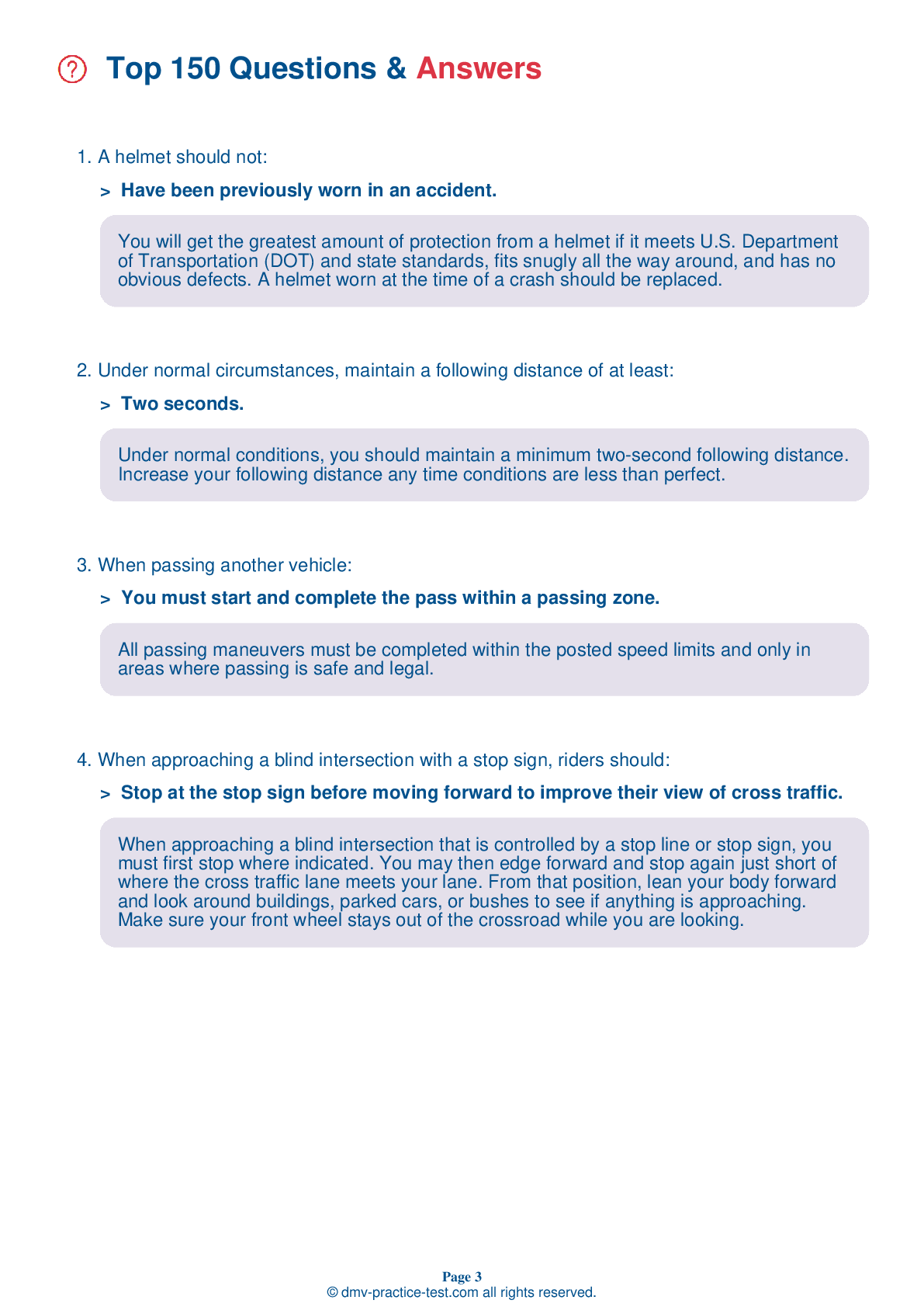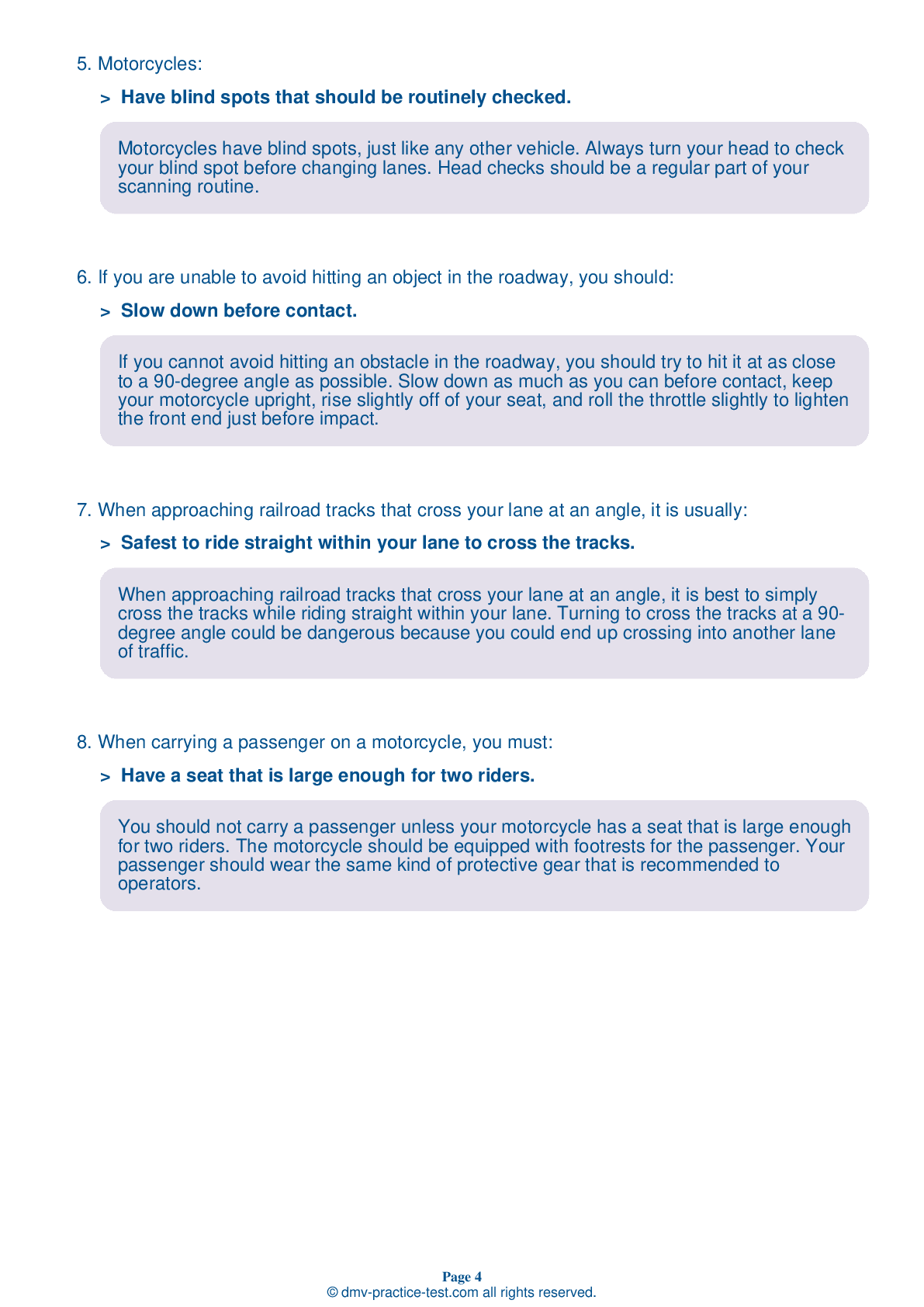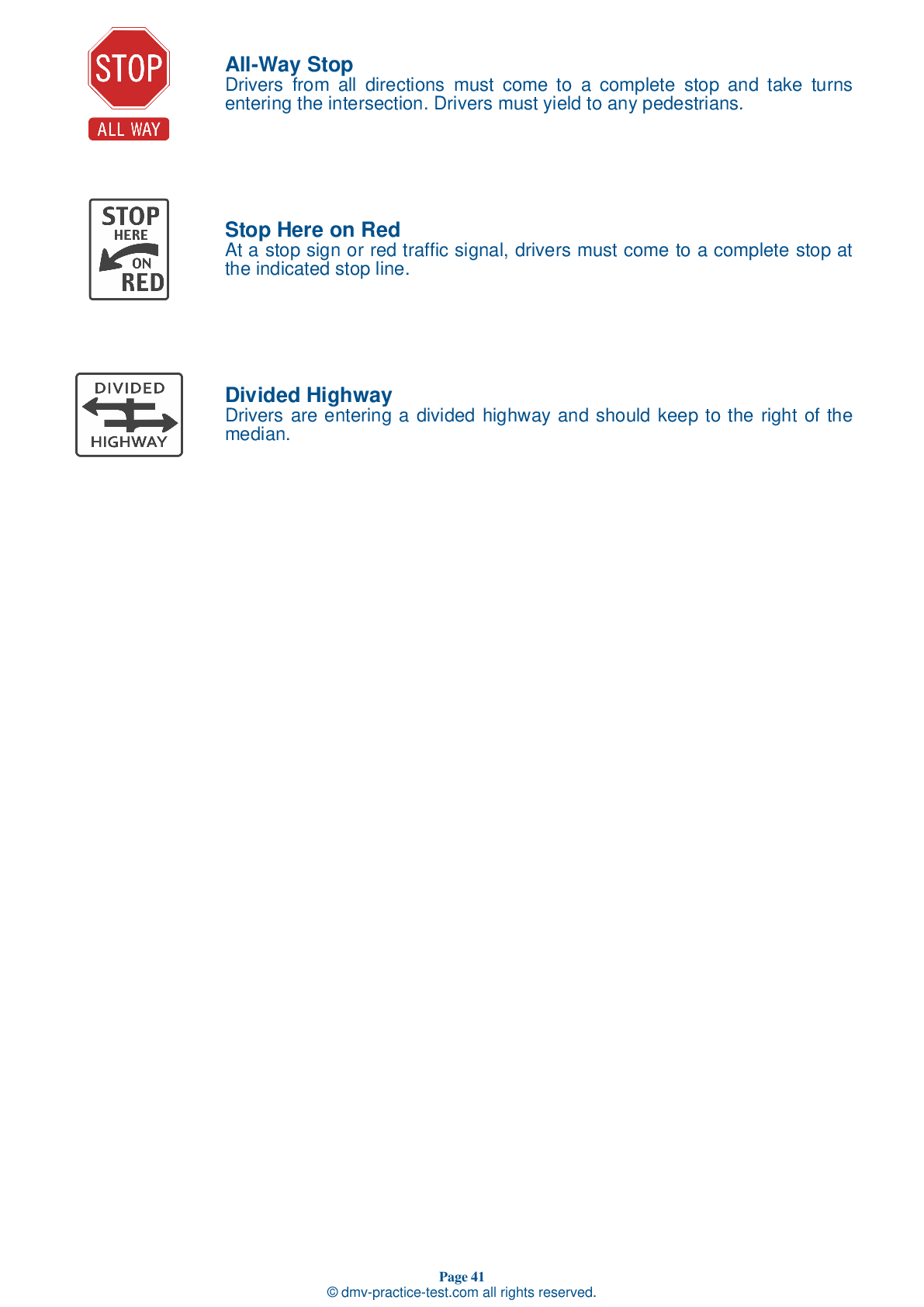DMV Permit Test #6
Motorcycle Test | License NH 2026 | FREE Online Practice! #6
Take this FREE motorcycle test (license in NH 2026) to check your knowledge of the road rules. To improve your results, download a motorcycle handbook online, study theory, and practice for free on our website. Still worried about how to get a motorcycle license in New Hampshire in 2026? Check our website for more sample tests, train as much as possible, and boost your grades!
25
20
16
1 . The first thing you should do if your throttle becomes stuck is:
Weave back and forth in your lane.
If your throttle becomes stuck, try twisting it back and forth several times. If this does not free your throttle, immediately operate the engine cut-off switch and pull in the clutch at the same time.
2 . This road sign means:
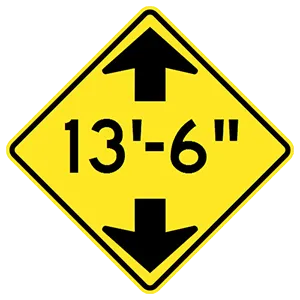
Two lanes of traffic moving in opposite directions are about to merge.
This sign warns that the overpass ahead has a low clearance. Do not proceed if your vehicle is taller than the height indicated (in this case, 13 feet, 6 inches).
3 . Before every ride, you should:
Fill the gas tank.
Before every ride, be sure your mirrors are clean and properly adjusted. It is important to be aware of what surrounds your motorcycle, and properly adjusted mirrors can help you do this.
4 . Low-speed crashes:
Happen frequently, so there is no need to worry about them.
Most motorcycle crashes occur at speeds lower than 30 miles per hour. Even low-speed crashes can be fatal.
5 . When carrying a passenger, you should:
Instruct the passenger after you begin your trip.
You should transport a passenger only if your motorcycle is appropriately equipped and adjusted to do so. Among other things, your motorcycle should have separate footrests for the passenger and a seat that is large enough for more than one person to sit comfortably. You may need to adjust your headlight, tire pressure, and suspension to accommodate the extra weight of a passenger.
6 . When being passed, all of the following are potential hazards, except:
Headlights.
When being passed, motorcyclists should be careful not to be hit by any part of the passing vehicle, including its mirrors. In addition to the vehicle itself, motorcyclists should be aware of wind gusts coming from the passing vehicle and potential objects being thrown by a passenger in the vehicle who may not be paying attention to the road.
2026 New Hampshire | Frequently Asked Questions
In New Hampshire, to get a motorcycle license, you must first have a valid driver's license. Then, you'll need to pass a vision test and a motorcycle knowledge test to get a motorcycle learner's permit. After practicing with the permit, you can take the motorcycle skills test. If you pass, you'll receive your motorcycle endorsement. Alternatively, completing an approved motorcycle rider training program can waive the skills test.
In New Hampshire, the minimum age for obtaining a motorcycle driver's license is 16 years old. However, if you're under 18, you must also complete a driver's education course, have parental or guardian permission, and pass both a written and motorcycle skills test. Always remember to wear a helmet for safety while riding.
Yes, in New Hampshire, you need a dedicated motorcycle license or an endorsement on your regular driver's license to operate a motorcycle. To get this, you need to pass a written test, a vision screening, and a motorcycle skills test. If you're under 18, you also need to complete a driver's education course and have parental or guardian permission.
When applying for a motorcycle license in New Hampshire, you'll need a valid New Hampshire driver's license, proof of identity (like a birth certificate or passport), and proof of residency. If you're under 18, you'll also need parental permission. If you've completed a motorcycle training course, bring your completion certificate.
Yes, in New Hampshire, you're required to take a written exam to get a motorcycle license. This test covers various topics including traffic laws, safe riding techniques, and road sign identification. However, if you successfully complete a state-approved motorcycle rider training program, the written and skills tests may be waived.
The motorcycle written test in New Hampshire covers a variety of subjects including motorcycle operation, safety rules, road signs, and laws. It also focuses on safe riding techniques, handling dangerous situations, and protective gear. The test is designed to evaluate your knowledge of New Hampshire's motorcycle laws and safe riding practices. Make sure to review the state's Motorcycle Operator Manual before taking the test.
In New Hampshire, taking a motorcycle training course does not substitute the written test. However, successful completion of a Basic Rider Course (BRC) can waive the practical motorcycle skill test. The written test is still mandatory to ensure you have a thorough understanding of road rules and regulations pertaining to motorcyclists. Always check with the DMV for current rules.
To enroll in a motorcycle training course in New Hampshire, you need to find a state-approved program such as the Motorcycle Rider Training Program. You can register online or over the phone. The course fee is usually due at the time of registration. You'll need a valid driver's license or motorcycle learner's permit to enroll. Courses typically include classroom instruction and hands-on training.
No, you don't have to own a motorcycle for the license test in New Hampshire. You can use a borrowed motorcycle as long as it is properly registered, insured, and safe for road use. However, you must be comfortable and familiar with the motorcycle you'll be using for the test.
Yes, you can use a friend's motorcycle for the driver's license evaluation in New Hampshire. However, the motorcycle must be registered, inspected, and insured. Furthermore, you must have a motorcycle learner's permit and the motorcycle must meet the state's safety standards to be eligible for the road test.
Yes, the New Hampshire motorcycle driving exam tests various handling skills. These include starting and stopping, turning and swerving, and quick stops. Also tested are skills such as negotiating intersections and curves, maintaining proper speed, and demonstrating safe driving habits. The aim is to ensure the rider's ability to safely operate a motorcycle under different conditions.
New Hampshire doesn't impose specific limitations on new motorcycle drivers. However, it's recommended that new riders take the Motorcycle Rider Training Program, which provides valuable skills and safety tips. Also, remember that while New Hampshire doesn't require helmets, other states do, so always wear one for safety and to comply with varying laws.
Yes, your New Hampshire motorcycle license allows you to operate a motorcycle out of state. Most states recognize out-of-state motorcycle licenses. However, you should still familiarize yourself with the specific motorcycle laws in any state you plan to visit, as they can vary and may have different requirements or restrictions.
In New Hampshire, motorcyclists over the age of 18 are not legally required to wear a helmet. However, the state strongly recommends wearing one for safety reasons. Riders under the age of 18 must wear a helmet. Despite the law, it's always a good idea to wear a helmet to reduce the risk of serious injury.
In New Hampshire, there are two types of motorcycle licenses: a motorcycle-only license and a motorcycle endorsement on an existing driver's license. The motorcycle-only license is for those who only want to operate motorcycles. The endorsement is for those who already have a standard driver's license and want to add motorcycle driving privileges.
Yes, in New Hampshire, you can add supplementary endorsements to your motorcycle license. This typically involves passing additional written and skills tests. Endorsements can include things like operating three-wheeled motorcycles or carrying passengers. Always check with the New Hampshire Division of Motor Vehicles for specific requirements and procedures.
In New Hampshire, the motorcycle written test is primarily administered in English. However, if you need language assistance, it's recommended to contact the New Hampshire Division of Motor Vehicles (DMV) ahead of time. They may provide certain accommodations or additional resources to assist non-English speakers. Always check with the local DMV for specific language services.
An effective strategy to prepare for the New Hampshire motorcycle license test is to study the state's Motorcycle Operator Manual thoroughly. This guide contains all the information you'll need for the test. Practice exams are also available online. Additionally, consider enrolling in a motorcycle training course to gain practical experience and knowledge.
In New Hampshire, the motorcycle written exam is primarily administered in English. However, assistance may be provided for those who do not speak English as their first language. It's advisable to contact the New Hampshire Division of Motor Vehicles ahead of your test to inquire about available language assistance or translation services.
If you don't pass the motorcycle written test in New Hampshire, you can retake it. However, you must wait for ten days before retaking the test. This period is intended for you to review and better understand the material covered in the test. You'll need to pay a retesting fee each time you retake the test.
